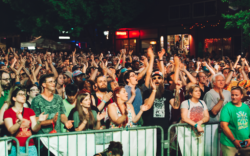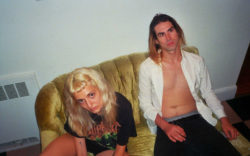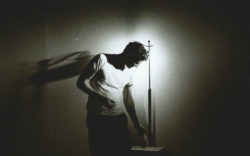At a certain point in the middle of the millennium’s first decade, the Athens music scene seemed to revolve around The Whigs. The young garage-rock trio had amassed an imposing fanbase thanks to a fierce live show and a canny ability to bridge the town-gown divide, which it did to an extent no local band has since. The release of the group’s 2005 debut, Give ‘Em All a Big Fat Lip, led to a groundswell of buzz well beyond the Loop.
Like any band on the cusp of something big, the group wasn’t without its detractors at the time. Flagpole sipped on the haterade in a review of Fat Lip, writing, “Here’s the problem with the Whigs. They rode their wave of hype and attention for so long with nothing really to show for it, and so when they do finally turn out a debut album, it seems more like a sophomore slump.”
The joke was on us: 10 years, four more LPs, countless tours, network TV appearances and critical accolades later, The Whigs have become bona fide rock stars, a prolific band of born performers with a proven knack for blending pop hooks and guitar power.
As the group, which has since relocated to Nashville, prepares to play its home-away-from-home-base of the 40 Watt Club in celebration of the debut album’s 10th anniversary, Flagpole invited its original three members, as well as the Georgia football star and then-amateur recording engineer who helped make Fat Lip happen, to reflect on those early days.
Parker Gispert (guitar, vocals): I got super sick at the end of high school and ended up missing my first semester at UGA. Writing songs and playing music had consumed me by this point, and I took the recovery time to decide that I wanted to be in a rock band. Once I healed, I started waiting tables at Ribs Etc. in Atlanta and jamming with Julian [Dorio]. He was a year older than me; we’d gone to the same junior high/high school. I’d played drums in both a jam band and a metal cover band in high school, and Julian was the first guy who allowed me to play guitar and sing the songs I was writing. He was an exponentially better drummer than me, and not only did I get to play my songs, but I also got to watch him drum up close, which was a mind-blow. I was/still am his biggest fan.
Julian Dorio (drums): With both of us having older brothers, we were turned on to music we may not have come across otherwise. Parker’s approach seemed unorthodox in the best way and, at the very least, different from the college acoustic-rock scene at the time. It was truly a breath of fresh air. On weekends, as he was recovering at his parents’ home, I’d drive to Atlanta and play music with him in their basement, messing around with any ideas we could come up with, having fun and trying to find a sound. We put together four or five songs, some of which we still play today.
PG: We spent lots of time on the phone talking about what we wanted our band to be, what made music from previous generations relevant today and why particular new artists stood a chance of being heard by generations to come. That fall, I came up to Athens to see Stephen Malkmus and the Jicks play the 40 Watt and met Hank at a party the night before.
JD: One of our hometown friends who went to UGA said we had to meet his fraternity brother: “He’s a great guitarist and wants to find musicians to play and write with.”
Hank Sullivant (bass, vocals): I came to UGA from Memphis in fall 2001. Except for my roommate and my older sister, a junior, I didn’t know anyone. I also didn’t know anything about Athens music except the R.E.M./B-52s narrative. I’d chosen UGA mainly because my sister had always shown me a fun time when I visited. Heeding the advice of my elder sibling, I pledged SAE that fall. One of the Atlanta guys I got to know was always telling me that I had to meet his good friend Parker, who was coming to UGA that spring. Parker and I were finally introduced at a party that fall, and it felt like I was talking to someone for the first time in months. We discovered a shared love of Pavement and The Strokes. I liked Parker immediately. We planned to jam when he got to Athens, but in the meantime he put me in touch with his drummer friend, Julian.
JD: Hank and I got together and played in the attic of my house on Milledge—the green house across from Taco Stand. It took about 30 seconds to understand he was truly great. I think he was 18, but he played like he was 27. I called to tell Parker afterwards, but we weren’t sure if having two guitarists and no bassist made sense. For some reason the idea of a trio intrigued us, so I left it alone. I didn’t tell Hank “no,” but I didn’t pursue it further. We thought we should get a proper bassist.
HS: When I reached out to Parker after Christmas break, he told me they were looking for a bassist, not a guitarist. From the start, I think they were set on the trio. I asked him how the bassist hunt was coming, and he said “pretty terribly.” So, I convinced them, after some prodding, to let me try playing bass. Our first rehearsal was at Julian’s house. Within a couple of hours, we had “Violet Furs” and “Need You Need You” in finished form, and we were a unit after that.
PG: We were immediately a band. No doubt. It really was crazy. Hank was undoubtedly legit creatively and musically. He was a guitar player and had never played bass, but he picked the thing up for the first time and immediately crushed it.
HS: I was really attracted to Parker’s knack for songcraft and melody. He understood it as an art with tons of possibilities. We loved putting arrangements and structures together; everything was considered for the sake of the song.
Billy Bennett (engineer): I met The Whigs through a mutual friend in college. Hank had just joined the band, and Julian and Parker had already been jamming with each other for a while. We quickly became friends, sharing musical sensibilities and a deep love for Taco Stand.
HS: We were practicing at Nuçi’s, and someone started knocking on the door after we finished a song. It was all of the Nuçi’s employees, and they were like, “You guys are good!” I think that was our first outside feedback, so we were pumped!
BB: After a few months, they moved their rehearsals into the to the unused retail storefront of my dad’s plumbing business on Nantahala. They would regularly rehearse late into the night, much to the chagrin of the neighbors. But the building was zoned industrial, so there wasn’t much the neighbors could officially do, although we tried to accommodate them by putting a double mattress in front of the double glass doors. Still, to quote an oft-used band cliché, “They were loud.”
JD: I called DT’s Down Under and spoke to the owner, who was willing to give us a Thursday night and asked for our band name. We hadn’t come up with a name! We were only concerned with the songs. Parker’s roommate at the time, Devon McClure, suggested The Wigs. We thought it was pretty cool, and Parker suggested we add the “h.” Done! Our first show was a blast. A band fell off the bill, so we were asked to go on early and play late. Well, that’s not really possible when you only have 45 minutes of music. So we started early, and soon the tiny venue was packed with our supportive friends. We jammed a little bit to kill time. We also played “Violet Furs” twice. We got paid $63 from the door, which in hindsight didn’t really add up right, but we were happy to get anything. As we drove away from the venue, we talked a big game about going out for steak dinners soon.
HS: From the get-go, the shows were fun. There was so much energy onstage. It’s inevitable to fixate on a “golden era,” but 2002 and 2003 were very exciting years. We were adventurous with our songs, and our shows in Athens and Atlanta always ripped.
JD: I met Murphy Wolford thanks to my older brother, Michael, who had played a lot at Tasty World years before. Murphy was generous to give us a Thursday night at his club. I felt like we were getting a shot at the big stage. We were so excited! I’ll also never forget the night of that show: We were minutes from going on and the room was filling up. Murphy came up on the stage as I was setting up my kit and asked me when we wanted to play Tasty World again. We hadn’t played one note!
BB: Their shows began to be big events around town—a drunk, sweaty mix of frat kids and townies. They regularly sold out Tasty World, then the 40 Watt. Somewhere in there, they won a battle of the bands at Smith’s Olde Bar in Atlanta and got some recording time at Nickel and Dime Studios. They recorded three songs that I thought sounded good, but the band wasn’t over the moon about them. Other producers started to take notice—Geoff Melkonian and Ben Allen both took a stab at recording them—but for whatever reason, nothing ever had that magic. As momentum continued to build around their live shows, the pressure began to mount for the band to get some recorded material out there.
HS: This is my only semi-regret: that we didn’t just make an album right then in ’03. We were conservative about recording. We wanted to get it right on the first album, like The Strokes did.
PG: We started gaining a lot of momentum. It culminated in us playing our biggest out-of-town show to date at Smith’s Olde Bar in Atlanta. As I hit the last note of our set, I turned around and realized there was a dude onstage with us. It was like a VH1 movie or something. He was from RCA Records and wanted to sign the band immediately to a development deal.
HS: After meeting a couple of times with the RCA A&R person who fancied us, we were convinced that he was bad news, but our manager and lawyer persuaded us to give it a whirl, since it was a harmless demo deal. What transpired would be hilarious if it didn’t nearly kill the band.
PG: Hank and I dropped out of college, and we took the deal. Long story short, the relationship quickly took a turn for the worse and seriously demoralized the band. Just completely killed our vibe. Sucked us out of our naive headspace and exposed us to some harsh realities of the biz. To be perfectly honest, our music careers could have ended right there, and I am forever thankful that we were able to emerge from that deal unscathed legally.
HS: We would send songs, and the A&R person would get back saying stuff like, “Where’s the chorus?” And we’d say, “the part after the verse.” But he wanted Maroon 5-sized obviousness. It messed with our heads so successfully that, finally, Parker and I became depressed and just stopped writing music. Due to sheer inactivity, the deal fizzled, and that was that.
JD: We learned quite a bit from these experiences, but it nearly crushed our momentum. In spring 2005, we decided that at the very least we should record the songs we had been working and touring on for the last three years. We wanted to make something we were proud of and have fun doing it.
PG: Billy had been recording our practices for a few years, and we were regularly rehearsing at his father’s plumbing company. Even though he technically didn’t have any proper “engineering” credits, we believed in him, and he knew the songs and our personalities better than anyone else. Hank and I decided we wanted to finish college, and we collectively made the decision to record the album as a simple document of our group. We easily had triple the amount of material for a singular album, and it would have been weird if we never recorded a definitive collection of our songs. We all owed it to the music we’d made together.
HS: We wanted to make an album on our own, with Billy engineering—but where? I proposed the SAE house, which is empty in the summer. I had never been active in the fraternity, so my petitions to the elder alumni caretakers would probably be useless, but we did have the Georgia Bulldogs’ star kicker on our side, and we used this with great success! Billy and I handled the talks, and for most of June and July the house was exclusively ours.
BB: It was one of those harebrained ideas that proved to be a revelation in disguise. With the venue set, all we needed was the gear. I had been interning at Chase Park Transduction and putting together a small Pro Tools rig with the help of Dave Barbe. The band had their instruments and amps. But we were still missing a few key elements—mainly, high-quality microphones and pre-amplifiers. So, I asked my dad for a small loan, and the band pitched in about the same amount.
JD: We purchased quality recording equipment online with the plan of selling it on eBay afterwards. Mattresses and couches were used as baffling. The AC was turned off for the summer, so we sweated day and night, but we loved every minute of it.
HS: We were on a mission. We also needed to rediscover our mojo. It took a few days to get anything going, but then we got on a roll with the instrumentals. After transforming “Written Invitation” into a downtempo Smokey Robinson heartbreaker, we started taking liberties with all our songs. The spirit of the frat house was present—I remember guzzling so much Budweiser all summer. On one really lovely July evening, we took three microphones out to the street, where the four of us shotgunned beers in stereo as cars zoomed by.
BB: With downtown Athens literally out the front door, there was some partying going on, for sure, but mostly we kept our heads down and worked hard, although it doesn’t feel like work in retrospect. Most of the songs were tracked live with the band in the room, and we’d overdub parts and vocals over that. We hauled in a beat-up piano from Hank’s house and had Chick Piano send down their piano tuner, who had a hell of a time wrangling that thing into being recordable. It ended up being [tuned a half-step too low], but we used it on “Nothing is Easy” and “Say Hello” to great success. After six or eight weeks, we moved back to Athens Plumbing to finish vocals and editing.
HS: Shortly after we’d left the house, I had a burst of creative energy and wrote a lot of music. To me, the music had nothing to do with The Whigs, and I actually considered leaving the band right then. People near and dear dissuaded me.
PG: We sent the tracks for “Technology” to anyone who wanted a chance at mixing the record and were sent back seven or eight mixes of the same song. Everyone thought David Axelrod’s mix sounded the best. David mixed the album in his Nashville basement on a set of headphones. Julian, Hank and I drove up to Nashville together, and the album was mastered on Music Row. I remember the boxes of CDs showing up at our house and feeling genuinely horrified at the prospect of selling them.
JD: There were so many boxes I could barely fit them in my SUV! I thought we’d never sell all of them. They were stored in a closet at Athens Plumbing. I still can’t believe it, but we kept going back to that closet as they sold at shows.
PG: Flagpole was the first to review our album, and it got trashed.
JD: After Rolling Stone named us “perhaps America’s best unsigned band,” we garnered the attention of ATO Records. Unlike our experience with RCA, ATO was straightforward and honest. We signed with them in the summer of 2006. Parker and Hank finished their final exams, we drove to our lawyer’s office in Atlanta to sign the deal, and we immediately hit the road for a four-month tour.
BB: Once the band was signed to ATO, they asked me how much I wanted to be paid. We went to Inoko and, over a fine hibachi dinner, they presented me with a check for the same amount as the loan I got from my dad. I can’t say for sure if the check ever made it his way, though.
HS: Before the last show of the tour, in Fort Lauderdale, I had time to kill and went swimming in the ocean. I remember feeling lucky to do what I was doing and getting this weird hint of excitement. That night was my last gig as a Whig. I left the band a little after Thanksgiving.
PG: I felt great about the album then, and I still do now. It would have been really easy for us to not have recorded anything at all. It encapsulates a big chunk of time for us, and I’m super proud we stood our ground, didn’t give up and ultimately found the inspiration to make the album.
BB: I felt privileged to be a part of it, as I was by far the least qualified person to record those guys at that time. But also, we were friends just having fun, with no promise of any gold at the end of the rainbow.
Like what you just read? Support Flagpole by making a donation today. Every dollar you give helps fund our ongoing mission to provide Athens with quality, independent journalism.










